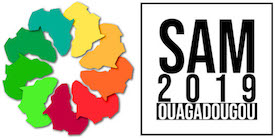At  last week’s SAM conference, Giorgi Samadashvili described a risk-sharing framework that Advans Ghana, a member of the France-based Advans Group, has been using to fund small-scale farmers. Since 2017, the institution has lent a total of EUR 534,000 (USD 600,000) to 5,400 farmers in partnership with the farmers’ suppliers and aggregators. The arrangement depends on very strong relationships with suppliers, which, of course, gain direct benefits from the farmers’ loans. The suppliers take initial loan applications from the farmers. They also recruit farmers for group meetings at which they can receive their loan proceeds. This allows Advans Ghana to service 200 to 300 farmers who live in remote areas within just one or two days, greatly cutting costs. The lender reports a 100-percent repayment rate from this framework.
last week’s SAM conference, Giorgi Samadashvili described a risk-sharing framework that Advans Ghana, a member of the France-based Advans Group, has been using to fund small-scale farmers. Since 2017, the institution has lent a total of EUR 534,000 (USD 600,000) to 5,400 farmers in partnership with the farmers’ suppliers and aggregators. The arrangement depends on very strong relationships with suppliers, which, of course, gain direct benefits from the farmers’ loans. The suppliers take initial loan applications from the farmers. They also recruit farmers for group meetings at which they can receive their loan proceeds. This allows Advans Ghana to service 200 to 300 farmers who live in remote areas within just one or two days, greatly cutting costs. The lender reports a 100-percent repayment rate from this framework.
The scheme involves the farmer paying 20 percent to 40 percent of the cost of the inputs as a cash downpayment. The supplier is paid an additional amount by Advans, so it receives 90 percent of its income within 60 days of delivering the inputs. The remaining 10 percent of supplier income acts as a guarantee, being deferred until the farmer completes repayment. The aggregator, which buys the produce at harvest time, also pledges a guarantee of 10 percent to 20 percent. This leaves Advans Ghana with exposure of no more than 60 percent.
Although Advans Ghana has used the same concept to lend to rice and cashew growers, most of the participants are cocoa farmers who borrow to buy pruners, fungicide and insecticide. As part of the process, Advans Ghana expends significant resources educating farmers about the product. This includes how to repay the loan via mobile money, although poor connectivity sometimes makes this troublesome.
In closing, Mr Samadashvili suggests that we “keep the client in mind” as we ask ourselves, “How can we deliver better solutions to farmers?”. If we do this, he says, everyone in the value chain will reach their goals.
Other presenters at the session included staff of Burkina Faso’s Coris Bank International, who explained how that firm lends to members of the rice value chain; Advans Côte d’Ivoire, which provides financial education and lends to farmers for inputs for growing cocoa as well as imports like trucks; International Solidarity for Development and Investment (SIDI), which lends to rice growers in Niger as well as onion and corn farmers in other countries; and Banque Agricole du Faso, which the government of Burkina Faso launched in February 2019.
François Kaboré of Banque Agricole du Faso explained that his organization lends largely for cotton production, although also for fisheries, sesame, agroforestry and nuts, including to value-chain operators and importers of harvesting equipment. Banque Agricole du Faso also uses risk-sharing arrangements, with a 10-percent portion of the risk accepted each by the buyer, supplier and farmer.
Albert Sié Dah of Advans Côte d’Ivoire described the process of getting suppliers interested in taking on 10 percent of farmers’ risk. Of course, it is easier to engage more suppliers after having success with the first. Among the benefits for suppliers, in addition to locking in more customers, is that Advans gives them data, such as on how farmers are using the inputs they buy.
This article is part of a sponsored series on SAM (the French acronym for African Microfinance Week), a major conference dedicated to financial inclusion in Africa. The most recent SAM took place in Ouagadougou, Burkina Faso, from October 21-25, 2019.
ADA, an NGO based in Luxembourg, co-organizes SAM every two years with the support of Luxembourg’s Ministry for Development Cooperation and Humanitarian Affairs. The SAM steering committee members are: ADA, Luxembourg’s Ministry of Foreign and European Affairs, the Microfinance African Institutions Network, the African Rural and Agricultural Credit Association, and the Fédération des Association Professionnelle des Systèmes Financiers Décentralisés de l’Union Economique et Monétaire Ouest Africaine. We invite you to learn more about SAM at http://www.sam.africa.
MicroCapital has been contracted to promote and document each SAM since 2015.
Additional Resources
Other MicroCapital coverage of SAM and vignettes demonstrating its value to participants
http://www.microcapital.org/category/semaine-africaine-de-la-microfinance-sam/
Vignettes demonstrating the value of SAM en francais
https://www.ada-microfinance.org/fr/evenements/semaine-africaine-microfinance/objectif-sam-2019/paroles-de-nos-participants
Similar Posts:
- MICROCAPITAL BRIEF: Tingo Mobile Launches Visa Card, TingoPay Super App, Business Portal in Africa
- SPECIAL REPORT: Save the Date for SAM 2023 – African Microfinance Week – in Togo, October 16-20!
- MICROCAPITAL BRIEF: Oikocredit Lends $3.3m to Witti Finances to Support SMEs in Côte d’Ivoire
- SPECIAL REPORT: Inclusive Finance in Africa Amid the Current Food and Climate Crises, in Anticipation of SAM 2023 in West Africa
- MICROCAPITAL BRIEF: Patasente Agricultural Trading Platform Accesses Credit Line Via Verdant Capital for Onlending, Invoice Discounting in Uganda
